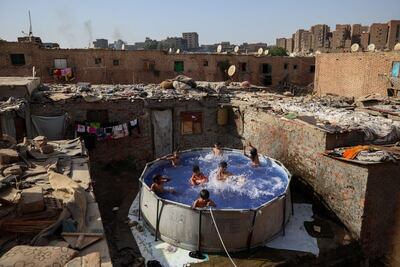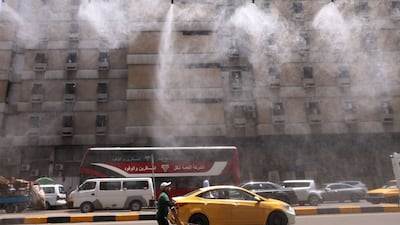Blistering summer heat is nothing new in many parts of the Middle East, even in this era of global warming. For centuries, the people of this region have used all their ingenuity and resilience to cope with high temperatures and humidity. From the Sumerians developing advanced irrigation systems to the barjeel system of ventilation, inhabitants of the region have adapted well to the weather. One would have hoped that modern technology such as air conditioning, refrigeration and electric fans would have consigned such struggles to the past. Sadly, for some countries, even in 2024 this is not the case. Mismanagement and corruption plague some nations, compounding the problems of excessive heat.
The National recently interviewed Lebanese pupil Mohammed Qassem, a resident of Baalbek, about enduring a summer heatwave in a country dogged by power cuts. “Most of us try to survive by using fans, but there are some people who can’t even afford that,” said Mohammed, who will sit his final high-school exams this month.
“The only way to study is directly under the fan, otherwise it’s intolerable. Summer nights are usually a little less hot outside so I sleep on the balcony, but that means I get eaten by mosquitoes,” he added. “So, it’s either I sweat on the floor or get attacked by mosquitoes on the balcony. There are no good options in the summer.”

In Iraq – a major oil producer – a lack of reliable electricity can leave citizens boiling in temperatures that can soar above 50°C during the peak of the summer. Temperatures were in the low 40s last week and hit 47°C during Eid Al Adha. In both Iraq and Lebanon, a combination of mismanagement, corruption as well as a legacy of conflict have turned 24-hour electricity – something that’s too often taken for granted – into an aspiration.
Such a situation is intolerable. In addition to avoiding the health problems that come with extreme temperatures, hospitals and homes should not have to rely on expensive and polluting generators for power. Industry and agriculture also depend upon a reliable electricity supply as ailing power grids threaten economic recovery. As temperatures and extreme weather look set to increase in frequency and intensity, countries must recast how they prioritise their electricity policy, turning it from a desirable objective to a national imperative. It may be unglamorous, but dependable and affordable electricity is the first step to ensuring stability.
What should be done? More workable, reliable and efficient solutions buttressed by international co-operation and investment are needed. An example of this practical joint action can be seen in the Gulf, where the GCC Interconnection Authority – a regional body that works to harmonise and improve electricity infrastructure among the six-nation bloc – has been developing an interconnector with southern Iraq. When complete, the project will supply 500MW of power. As of November, the project was reported to be 30 per cent complete and faster implementation to help many Iraqis avoid another hot summer in 2025 is needed.
A different kind of approach can be seen in Lebanon. This week, The National reported how Beirut could become reliant on a convoluted deal to import Iraqi fuel for its electricity needs, despite the lack of an agreed repayment plan. Experts say the arrangement is problematic and could lock the country into an unstable deal while delaying its transition to renewable or affordable energy sources. Even if the arrangement stays in place, it would generate only enough electricity by 2028 to power each household for eight hours a day.
There needs to be a move away from such a short-term, quick-fix approach. That requires international and regional co-operation that makes sustainable energy production and supply its first priority. Individual countries must also work much harder to wisely invest in their electricity infrastructure, shut down the black market in smuggled fuel and freeze out profiteers. The summer of 2024 is already upon us, but for many people in troubled countries in the Middle East, the next one needn’t be such a struggle.


